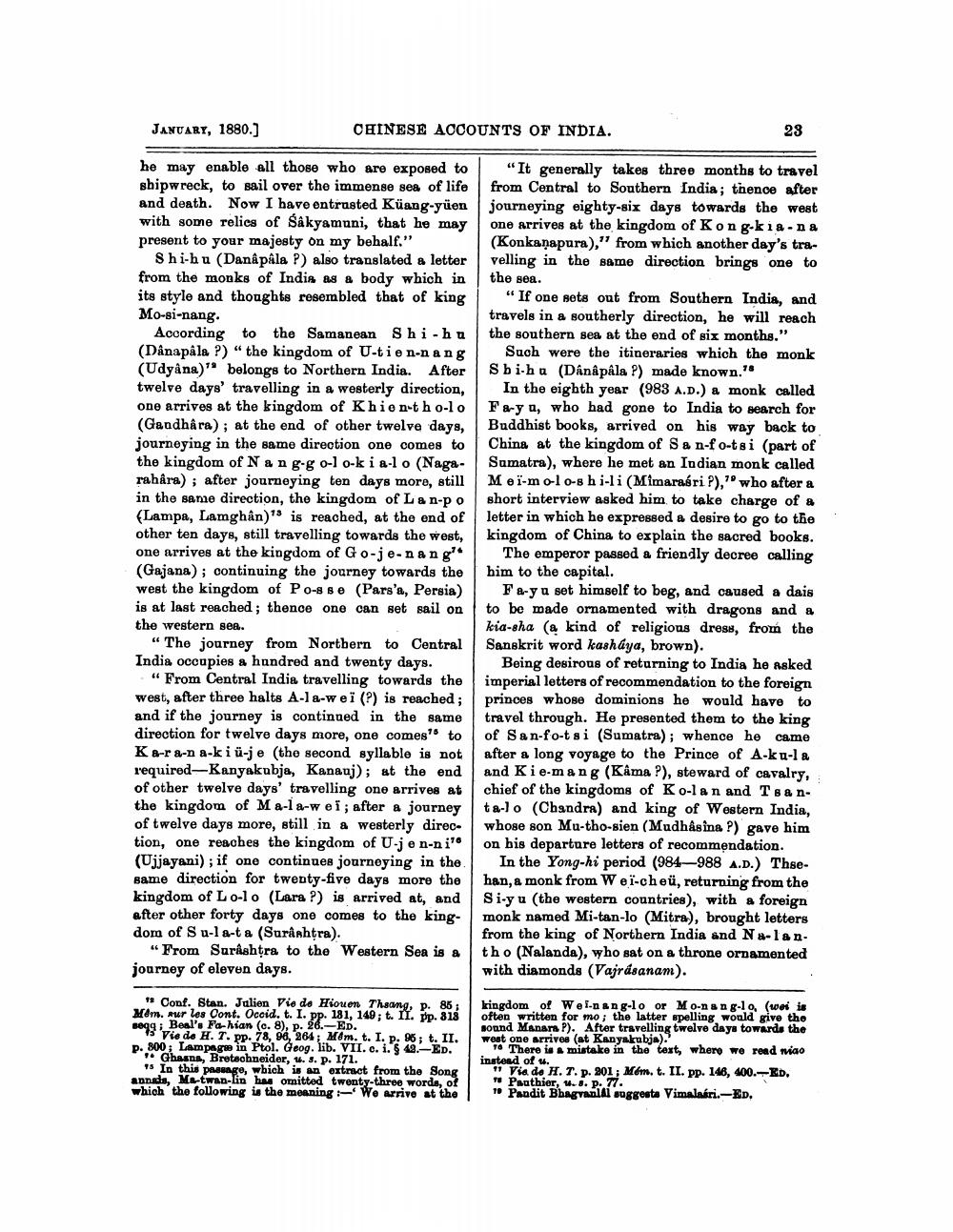________________
JANUARY, 1880.)
CHINESE ACCOUNTS OF INDIA.
23
he may enable all those who are exposed to "It generally takes three months to travel shipwreck, to sail over the immense sea of life from Central to Southern India; thence after and death. Now I have entrusted Küang-yüen journeying eighty-six days towards the west with some relics of Sâkyamuni, that he may one arrives at the kingdom of Kong-kia-na present to your majesty on my behalf."
(Konkanapura)," from which another day's traShi-hu (Danâ påla P) also translated a letter velling in the same direction brings one to from the monks of India as & body which in the sea. its style and thoughts resembled that of king “If one sets out from Southern India, and Mo-si-nang.
travels in a southerly direction, he will reach According to the Samanean Shi-hul the southern sea at the end of six months." (Danapala ?) " the kingdom of U-tie n-nang Such were the itineraries which the monk (Udyana)" belongs to Northern India. After Sbi-ha (Danâ pâla ?) made known." twelve days' travelling in a westerly direction, In the eighth year (983 A.D.) a monk called one arrives at the kingdom of Khion-tho-lo | Fa-ya, who had gone to India to search for (Gandhara); at the end of other twelve days, | Buddhist books, arrived on his way back to journeying in the same direction one comes to China at the kingdom of Sa n-f o-tsi (part of the kingdom of Nang-go-lo-kia-lo (Naga- Sumatra), where he met an Indian monk called rahåra); after journeying ten days more, still Mei-molo-s hili (Mimarasri P)," who after a in the same direction, the kingdom of Lan-po short interview asked him to take charge of a (Lampa, Lamghân)" is reached, at the end of letter in which he expressed a desire to go to the other ten days, still travelling towards the west, kingdom of China to explain the sacred books. one arrives at the kingdom of Go-je-nang' The emperor passed a friendly decree calling (Gajana); continuing the journey towards the him to the capital. west the kingdom of P 0-8 se (Pars'a, Persia) Fa-yu set himself to beg, and caused a dais is at last reached; thence one can set sail on to be made ornamented with dragons and a the western sea.
kia-sha (a kind of religious dress, from the “ The journey from Northern to Central Sanskrit word kasháya, brown). India occupies a hundred and twenty days.
Being desirous of returning to India he asked "From Central India travelling towards the imperial letters of recommendation to the foreign west, after three halts A-la-wei (?) is reached; princes whose dominions he would have to and if the journey is continued in the same travel through. He presented them to the king direction for twelve days more, one comes to of San-fo-tsi (Sumatra); whence he came Ka-ra-na-kiü-je (the second syllable is not after a long voyage to the Prince of A-ku-la required-Kanyakubja, Kananj); at the end and Ki emang (Kama ?), steward of cavalry, of other twelve days' travelling one arrives at chief of the kingdoms of Ko-lan and Tsanthe kingdom of Ma-la-wei; after a journey talo (Chandra) and king of Western India, of twelve days more, still in a westerly direc- whose son Mu-tho-sien (Mudhâsina ?) gave him tion, one reaches the kingdom of U-jen-ni" on his departure letters of recommendation. (Ujjayani); if one continues journeying in the In the Yong-hi period (984–988 A.D.) Thsesame direction for twenty-five days more the han, a monk from Weï-ch eü, returning from the kingdom of Lolo (Lara ?) is arrived at, and Si-yu (the western countries), with a foreign after other forty days one comes to the king. monk named Mi-tan-lo (Mitra), brought letters dom of Su-la-ta (Suråshtra).
from the king of Northern India and Nalan. "From Sarashtra to the Western Sea is a tho (Nalanda), who sat on a throne ornamented journey of eleven days.
with diamonds (Vajrásanam).
Conf. Stan. Julien Vie do Hiouen Thaang p. 85; Mém. Aur les Cont. Ocoid. t. I. pp. 181, 149; t. 11. Pp. 318 sogg Beal's Fa-hian (c. 8), p. 26.-ED.
13 Vie de H. T. pp. 78, 90, 264, Mam. t. I. p. 98 ; t. II. P. 800; Lampagæ in Ptol. Geog. lib. VII. c. i. $49.ED.
"Ghasna, Bretschneider, W. S. p. 171. .
* In this passage, wbich is an extract from the Song annads, Me-twan-lin has omitted twenty-three words, of which the following is the meaning Wo arrive at the
kingdom of Wel-nang-lo or Mo-nang-lo, (wer is often written for mo; the latter spelling would give the sound Manar P). After travelling twelve days towards the weat one arrives (at Kanyakubja)
* There is mistake in the text, where we read wiao instead of u.
• Via de H. T. p. 201; Mém. t. II. pp. 146, 400.--ED. * Paathier, ws. p. 71. * Pandit Bhagvanili suggesta Vimalaári.-ED.




